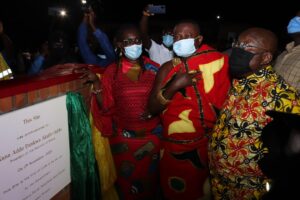- 1,000 more sites to be rolled out in Dec. 2020
The completion of 2,016 rural telephony sites at Atwereboana in the Adansi South district of Ashanti Region, under the Rural Telephony Project (RTP), has brought network coverage to over 300,000 unserved and underserved communities with a population of three million citizens, President Nana Addo Dankwa Akufo-Addo has said.
This development, according to the president, will provide an opportunity for over three million people to connect with their relatives and friends while also enabling them in gaining access to socio-economic, health and educational engagements.
The RTP, which is being financed by a €155million facility secured by the government from the China Exim Bank, is expected to help promote digital inclusion and reduce the digital divide gap.
Addressing a gathering of chiefs and some industry stakeholders at the project’s unveilling, President Akufo-Addo said modern communications have become vital to the growth of most economies. “Access to information empowers individuals and communities, enabling them to escape from poverty while laying the foundation for sustainable development.”
While recognising that network connectivity in modern times has become a basic necessity of life, just like water and electricity, he noted that some 30 percent of Ghanaians in rural areas have little or no access to information and communication technology – thus widening the digital divide.

He said if these individuals continue to be left out of the nation’s advances in ICT, it will lead to a lot of potential wealth and human resources being untapped. He, therefore, assured that the government is committed to ensuring every Ghanaian has access to affordable and reliable voice and data connectivity.
It is in this regard that he said the Ministry of Communications and Ghana Investment Fund for Electronic Communications (GIFEC) – in partnership with MTN, Vodafone and Huawei – are rolling out the rural telephony project. The project will provide data and voice connectivity to 2,016 rural telephony sites strategically located in underserved and unserved communities across the country.
The president said current technology being deployed through the project is about 50 percent less than the cost of traditional cell sites – making the project economical and financially feasible, and therefore it will generate good returns on investment.
“The Rural Telephony Project will also provide new areas for ICT growth in Ghana while raising substantially the level of ICT literacy, especially during this COVID-19 era when the need and demand for ICT skills has increased exponentially.”
The Administrator of GIFEC, Abraham Kofi Asante said: “Over the past couple of years, the purpose of the RTP has been to expand voice service to these communities, with populations of less than 1,500 – thereby improving their access to quality mobile service. Currently, however, the RTP has been enhanced to provide broadband service due to the evolution of technology”.
He said through this innovation, some 400 RTP sites serving about 1,200,000 people within 2,000 communities through innovations and partnerships have also been established.
“GIFEC is ensuring effective use of the equipment deployed in underserved and unserved communities by providing ICT capacity-building for all persons in both the formal and informal sectors, as well as teachers and students. Over the past four years, a total of 502,600 persons have been trained in ICT programmes. 182,000 children have been trained to provide solutions to social problems through the Coding for Kids project.”
Minister of Communications, Ursula Owusu Ekuful, reckoned that the project marks an important feat in the country’s quest to expand access to electronic communications for all underserved and unserved communities in the country.
She said the government has built close to 500 sites in three years while noting that the RTP project will build on this backdrop to extend connectivity to all parts of the country in the next 18 months – targetting to connect some 3.4 million Ghanaians to voice and data network.
The ministry, she said, will continue to provide the necessary policy and regulatory support, and promote initiatives and projects in line with its mandate of facilitating the development of reliable and cost-effective world-class communications infrastructure and services.
While commending the GIFEC and other partners involved in this Public-Private Partnership (PPP) arrangement, she disclosed that a total of 1,000 sites are expected to be rolled out by December 2020.










